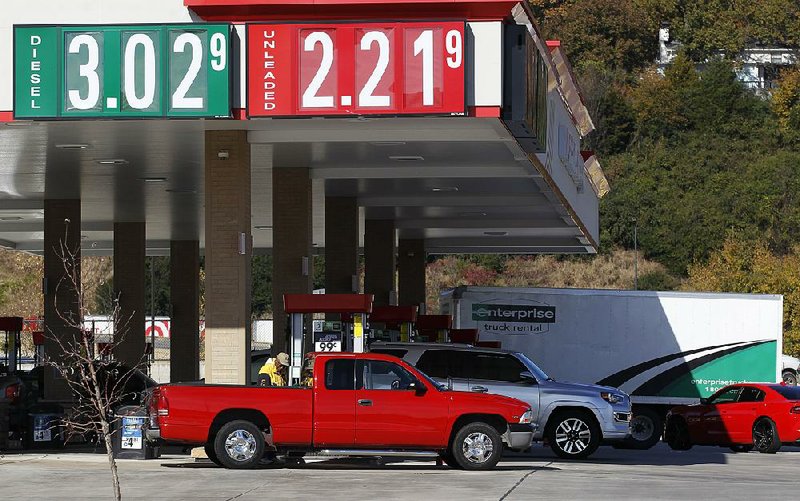WASHINGTON -- The swift and steep drop in oil prices has been the talk of Wall Street for several weeks and is good news for 30 million American travelers as they head into a busy Thanksgiving holiday.
But the the dramatic decline cuts both ways, with several energy firms big and small seeing their stock prices fall even as President Donald Trump cheers the lowest oil prices in more than a year.
Several small oil production companies have been shellacked by the commodity's price decline, with share prices dropping nearly 50 percent in recent days.
Benchmark Brent Crude and West Texas Intermediate both saw big price drops Tuesday. West Texas Intermediate fell 6.6 percent to close at $53.43. Benchmark Brent fell 6.4 percent to close at $62.53.
Prices rebounded a bit Wednesday after an industry report showed an unexpected decline in U.S. crude stockpiles. Benchmark U.S. crude gained 2.2 percent to $54.63 a barrel in New York. It fell 6.6 percent on Tuesday. Brent crude, the international standard traded in London, rose 1.5 percent to $63.48 a barrel.
Both are down more than 20 percent from their highs in early October.
"We are clearly in the danger zone," said Frank Verrastro, a global energy expert at the Center for Strategic and International Studies. "For U.S. producers, sustained prices below $50 would undoubtedly be problematic for all but the most efficient operators."
The current surplus is largely attributed to a miscalculation between demand and output by major producers, including Iran. A strong dollar is also weighing on oil prices because it makes oil more expensive for much of the world. Oil prices tend to fall as a result.
Oil is a boom-and-bust business. The price drops when supply exceeds demand. Producers pull back and slow production as a result of the price squeeze. When demand exceeds supply, producers start drilling again and the cycle picks up again.
The United States is the world's biggest oil consumer at about 21 million barrels a day of the 100 million barrels produced daily worldwide. It is also a top oil producer, thanks to the shale oil renaissance over the past half-decade.
Oil and gas represent about 7.6 percent of U.S. gross domestic product. Low prices have a salutary effect across the economy, including moderating the rate of inflation. By helping to keep inflation low, low oil prices can stem the rise of interest rates, including for mortgages and auto purchases.
Oil prices dove quickly Tuesday on President Donald Trump's endorsement of strong ties to oil producer Saudi Arabia, the defacto OPEC leader currently under fire after the murder of dissident journalist Jamal Khashoggi, a contributing columnist for The Washington Post, in October.
Saudi Arabia's willingness to maintain production is crucial to keeping oil prices low. It was contemplating a cut in production at the December meeting of OPEC and allied producers, which could raise prices.
Trump has imposed severe economic sanctions against Iran, which limit the ability of other countries to buy Iran's oil. The move was expected to drive up oil prices, which would make it more costly for consumers and businesses, but oil prices have stayed low in recent months.
In a move that limited the impact of the Iran sanctions on oil prices, however, the White House gave temporary waivers to eight countries that allowed them to keep buying Iranian petroleum, at least for a little while.
Information for this article was contributed by Terrence Dopp and Alex Nussbaum of The Washington Post.
Business on 11/22/2018
